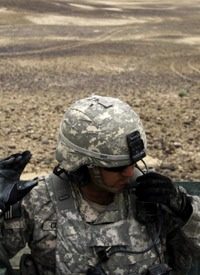
In what may have sounded at times like a replay of a Vietnam War debate, baby-boomer Dennis Kucinich (D-Ohio) and septuagenarian Ron Paul (R-Texas) fought in vain to derail further funding of the nine-year war in Afghanistan that, together with the war in Iraq, has cost the United States nearly $1 trillion and thousands of lives.
The House approved another $59 billion for Afghanistan and easily defeated a resolution, cosponsored by Kucinich and Paul, to remove U.S. troops from neighboring Pakistan. The resolution, voted down 372-38, charged that U.S. military troops and operations in Pakistan violate the provisions of the War Powers Act, which was passed during the latter stages of the Vietnam War over the opposition of the Nixon administration. The resolution cited the absence of a declaration of war or other authorization by Congress of war in Pakistan.
In a debate that put the constitutional issue of separation of powers front and center, Paul charged that Congress has been abdicating its responsibility to oversee military activities. "We just capitulate and give them the money and do whatever," he said. "The American people don’t know about it until we get deep into these quagmires." Paul, a veteran Republican Congressman who was the Libertarian Party candidate for President in 1988 and sought the GOP presidential nomination in 2008, was at odds with most of his colleagues on the Republican side of the aisle, including Dan Burton of Indiana. Burton argued that the United States must rely heavily on Pakistan, especially given the lack of precision in the Afghan-Pakistan border.
"If we cut military ties with Pakistan — it’s crazy," Burton said. "It’s extremely difficult to know where those borders are, and we must not allow the enemy to have sanctuary."
With Vietnam memories being revived by talk of "quagmire," Howard Berman, a California Democrat may have unintentionally brought to mind another aspect of U.S. involvement in Vietnam, which began with several thousand American advisors and later escalated into a war involving a U.S. force of some half a million. Berman said U.S. forces in Pakistan are not engaged in "hostilities," but are training the Pakistani military in counterinsurgency warfare. The War Powers Act, he said, "doesn’t deal with the presence of military forces without an authorization of Congress. It deals with the engagement in hostilities." To Paul, it was a distinction without a difference.
"It’s true there are no armies facing each other killing each other, no tanks, not those types of hostilities," he said. "We don’t live in a conventional era, and there aren’t that kind of conventional activities going on. But there are hostile actions going on." In fact, the United States has been bombing in Pakistan, using unmanned Predator "drones" to hit insurgent targets, often killing innocent civilians in the process. That "collateral damage" was cited by Pakistani Faisal Shahzad as the main reason he attempted the failed Times Square bombing in New York several weeks ago.
The additional $59 billion for Afghanistan passed by a vote 308 to 114, with much of the debate fueled by news of the thousands of pages of recently leaked classified documents analyzing the chances of success of the military venture in a land known as "the graveyard of empires." Napoleon’s French army and the Soviet Union are among the imperial powers that suffered defeat at the hands of Afghan guerillas in a nation that lacks effective central authority and has sometimes been dismissed as a land "of rocks and brigands."
The leaked documents are yet another similarity between the wars in Afghanistan and Vietnam. In 1971, the Nixon administration tried to prevent the New York Times from publishing the Pentagon Papers, a collection of classified government documents about the decisions made concerning Vietnam. In a landmark Supreme Court case, the justices chose not to permit a prior restraint on publication of the documents, many of which dealt with the history of the conflict and the reasoning behind the decisions for expanding it.
President Obama and top military officials said Tuesday that the disclosure of the documents should not force a rethinking of America’s commitment to the war. "While I’m concerned about the disclosure of sensitive information from the battlefield that could potentially jeopardize individuals or operations," the President said in a rose Garden press conference, "the fact is these documents don’t reveal any issues that haven’t already informed our public debate on Afghanistan."
Photo: AP Images

